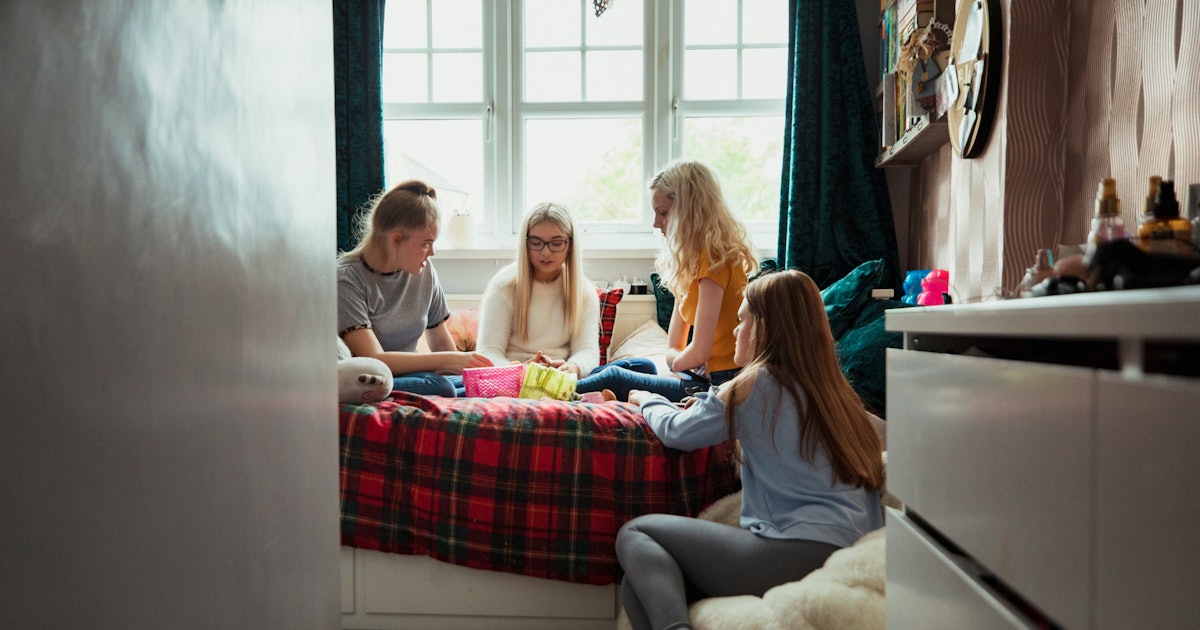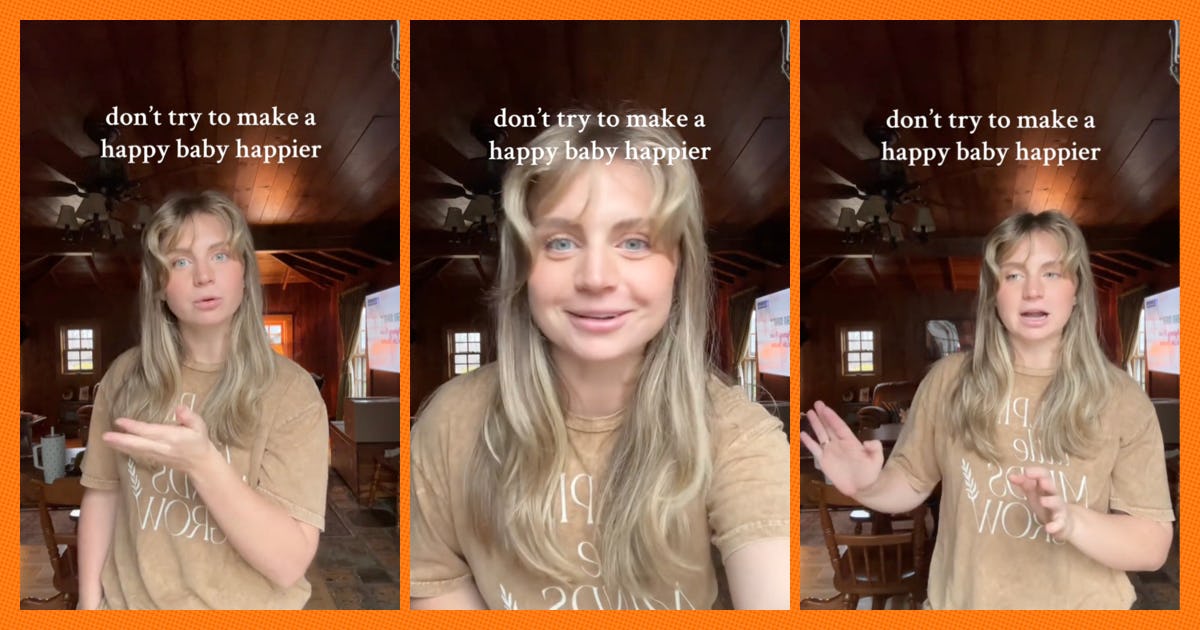My oldest daughter is 10 years old and has been spending about two years with a group of her best friends. The four of them travel as a group—go to school events together, plan sleepovers, work on class projects together—and my favorite thing is when all four of them sit at the kitchen table and tell me what happened in class that day things or rate their favorite Taylor Swift song. But by age 10, they also talk a lot about the world around them. They’re in that adorable in-between stage where they’re confident enough to ask questions about the state of the world, but still love to play hide-and-seek. Now, they still like to talk to me. So when one of my daughter’s best friends asked me who to vote for, I didn’t know how to answer.
It’s not that I’m not proud of who I’m voting for, or that I’m a “non-political” person. It’s just that she’s not my child. In a political landscape that has become increasingly fractious to navigate over the past eight years, it makes sense to err on the side of caution before telling someone you voted for someone whose parents spent all night talking bad about you.
I had a good feeling that my daughter’s friend’s family voted like us, so I decided to share it with her…and let it be that. However, I am worried that she will ask me more questions – will I explain these questions to her clearly? Would I ignore her request for information? Isn’t that what we want for our children to question things, ask questions and feel empowered when talking about issues that directly affect them? – But that’s it. She was curious about who we were voting for, and I shared that with her.
Now I wonder how far you can go in having a political conversation with a 10-year-old who is not your own. I’m sure this happens every election, even before 2016, but is the way to go about it all right or wrong? If we want to have open communication with our children and peers, if we want to be seen as a “safe house” and a “safe mom” where they can say anything, do we need to make sure we do it in a specific way?
Socialization and Intention
It’s easy to worry that another parent might catch you talking about politics with their child and lash out, but as Dr. Annemarie MacLean, assistant professor of media science at Boston University, told me, our kids are constantly being socialized— — even if we don’t want it to happen. “Social is not just about what we say, it’s also about what we do No explain. And very importantly, the outside world is always socializing children as well, and this duality has different effects on different families with different perspectives and life experiences,” she said.
When I asked her if she would share who I voted for with her kids’ friends, McClain was clear: There’s not a right or wrong answer to this question; The answer to whether this is appropriate may vary from family to family.
While McLean said she firmly believes, based on research, that children can listen, discuss and talk about politics in developmentally appropriate ways, that doesn’t mean that’s appropriate for every child and family. When faced with a situation like this, she says, we should ask ourselves what our goals are in sharing or not sharing. If you’re hoping to share so you can educate a child who’s not yours about policy and why you think supporting a certain candidate is the right way to vote, then maybe you don’t need to get involved.
But if you want to create an open environment where they feel empowered to ask questions about the things they hear, read, and see, consider this intention. “I encourage us all to remember that whether we talk explicitly about politics and our voting decisions, or remain silent, we are socializing our children around politics. Socializing is not always verbal. no say something, or say “I don’t want to talk about it,” we still Send a message to our children and their peers. It’s important that we think about what message we want to send,” McLean said.
So, what do we want our children and their friends to know? “Do we want to say that politics is off the table, we can choose not to talk about it, we shouldn’t ask about it, it’s not important for friendships, etc.? Or do we want to communicate and normalize it?” Different approach?
Regardless of differing opinions on the answers to these questions, the bottom line is that we need to make sure that, as the adults in our children’s lives, the messages we send—even if they are unintentional or unspoken—are the ones we wish we “Children can not only see that in us, but be able to go out and potentially replicate themselves,” she said.
Politics is everywhere
The truth is, our kids are paying attention to politics all the time. They hear radio ads; they watch clips on TV; they hear adults talking. So when kids ask about politics, we can’t think of it as a conversation about Kamala Harris and Donald Trump, or what the policy is or what it means for the Supreme Court, but rather how we want them to handle it themselves Such conversations. Kids are looking for more than just actual information about the election, they’re watching us learn how to handle our own affairs at recess, sleepovers, and at school.
“What do we want them to know about politics and the world they inherit?” McLean asked. “How do we want them to handle differences? Decide their own boundaries? Think for themselves? Stand up for others? These are questions we need to be thinking about and we can have clear conversations with our kids as we and they figure out how to navigate today’s world. .
When approaching conversations about misinformation, MacLean is also careful to point out that everyone is different. What seemed like a wrong message to me was not a wrong message to the family of the child who repeated the message. Instead of trying to educate or learn from what they shared “incorrectly,” McLean says, instead, reconsider what kind of behavior and information they want to see from you.
“You can ask kids questions like, ‘Where did you hear that?’ ‘What made you think that?’ “How do we know if this is true?” ” You can interrupt the error message by saying something like “I’m not sure if this is true” or “We need to look into this.” Then figure out what you want to do in the future, and you may also decide as a family you will combat misinformation about all topics or certain topics, again depending on how safe your family feels and what your goals are. ” she said.
Diplomacy Lessons
But again, if you’re hoping to nip some misinformation in the bud by discussing this issue, that’s not the right intention. While MacLean agrees that the integrity of data and information should always come first, “for example, sometimes error messages can become personal and identity-related, and then it can become more urgent. and Talking about them is more challenging. But what if there is a child in the room who shares their identity? What if a neighbor has this status? What are we teaching our children if we speak out, and if we don’t speak out?
It’s true that talking about politics with your kids and their friends doesn’t mean you should have a homemade debate and start talking about policy and tax reform and what’s at stake in this election. When your children and their friends ask you a question about who you voted for or why you support a certain candidate, they are learning how Discuss politics.
“It’s important to make sure kids know they can talk to us adults, because socialization from trusted adults in their lives can play a big role in what our kids believe and how they respond to situations,” McLean said. While we always The hope is to combat misinformation and educate kids, but she said it’s really about teaching kids how to address the issue so they can be empowered and empowered to have their own conversations. Whether it’s with their peers or through their own private understanding, providing them with resources on how to talk about politics and what politics means to different people is much better for them than just knowing who you’re going to vote for.
Then they’ll be ready the day someone asks them.




